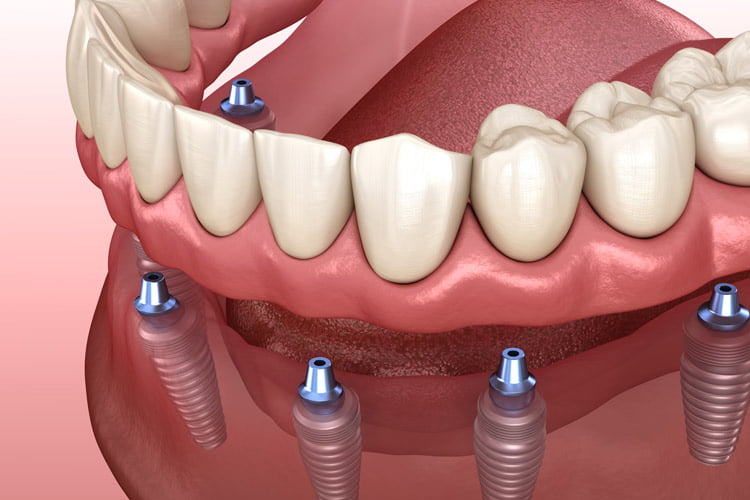Dentures
From choosing a denture when you've lost your teeth to learning to adapt to your new teeth
Your Dental Health Associates of Madison dentist will be there to help every step of the way.
If you have lost all of your natural teeth, or your remaining teeth are too weakened by cavities or gum disease to be fixed, a complete denture may be a good option for you. When many teeth are missing, it becomes difficult to speak, eat, and smile with confidence. Complete dentures replace a full set of upper or lower teeth, and can recover your smile. Your DHA dentist can help you choose which type of complete denture — conventional, immediate, or implant supported — is right for you.

Types of Dentures
There are several options when it comes to choosing dentures. Your DHA dentist will take your needs into consideration and work with you to find a solution that is right for you.
Conventional Dentures
(A Good Fit if You Can Wait)
Conventional complete dentures are made to replace a full arch of missing teeth with healed gums. This type of denture is made for people who already have complete dentures that are worn out and need replacement, or for people who are getting their first dentures and are willing to be without teeth for 6 to 8 weeks following tooth removal. For first time denture wearers, the benefit to this type of denture is a better fit when compared to immediate dentures. After tooth extractions, the bone surrounding the missing teeth changes shape and shrinks. The majority of this change takes place during the first month after tooth removal. Dentures depend on the underlying bone for stability and support, so the more healed the bone is at the time dentures are made, the better they will fit in the long run.
Immediate Dentures
(A Quick Replacement)
An immediate denture is made before your remaining teeth are removed, so that the denture is ready for you to wear the same day that your teeth are extracted. The main advantage of immediate dentures is that you are never without teeth. The main disadvantage, is that immediate dentures do not fit well over time. As the bone heals and shrinks after teeth are removed, the denture becomes loose. A new denture lining will be needed in 6 months to a year, and may be very loose in the meantime.
Implant Supported Dentures
(the Best Fit)
A dental implant is a titanium tooth root replacement that can support crowns, bridges, and dentures. Implants dramatically improve the support and stability of a denture, so that you can comfortably speak, chew, and smile. Typically several implants are placed for the denture to attach to. Not everyone has enough bone to have implants. Your DHA dentist can let you know if you might be a good candidate for dental implants to support your complete denture.
Dentures FAQs
Dentures take time to get used to. They are not like natural teeth, and it will take time and practice adapting your speech and chewing to your new dentures. New dentures also require multiple appointments to adjust sore spots. Your DHA dentist will instruct you on how to adapt to your new teeth.
Even though you do not have any teeth, you still have to take care of your mouth. Daily cleaning of your tongue and gums with a soft brush or washcloth is advised. Yearly visits to the dentist are recommended for patients with complete dentures. A dentist will check the health of your gum tissue, conduct an oral cancer screening, clean your dentures, and check the fit of your dentures at your annual visit. Dentures do not last a lifetime. Your dentist will advise you when it is time to replace your dentures due to poor fit or worn teeth.
Plaque collects on your denture, and must be removed daily to prevent gum irritation or fungal infection. Dentures should never be worn while sleeping, rather cleaned with a soft brush and placed in denture cleaner or fresh clear water. Do not allow your denture to dry out. Dentures are very brittle and may break if dropped. Consider cleaning your denture over a towel or water-filled basin to prevent damage if accidentally dropped.
The cost of a complete denture varies depending on what type you choose, and if dental implants are used. Insurance coverage for a denture can range from 0% to 100%. Your specific coverage depends on your insurance company and individual plan. To find out what percentage may be covered by your insurance plan, refer to the information provided to you when you enrolled, or call the 1-800 number on the back of your card to ask a representative. If you need help obtaining this information, a Dental Health Associates front desk staff member would be happy to help you. If you are a DHA patient, our financial coordinators will help you obtain an estimate of coverage if requested.
Patient Information
We encourage new patients to fill out a new patient form online prior to your first appointment. Be sure to select the appropriate location for your new patient forms, as once you complete them, they are sent electronically to the office you’ve chosen.
Insurance
Medical and dental insurance can be confusing. Our staff has experience with your questions and can help you get the most from your insurance.
No insurance? Apply today.